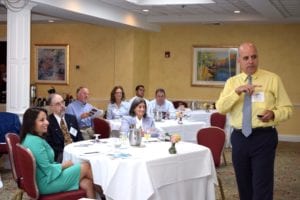Who is a member?
Our members are the local governments of Massachusetts and their elected and appointed leadership.

Patrick Cook (right), a media relations professor at Suffolk University, talks about social media use and crisis communications during the Massachusetts Municipal Councillors’ Association meeting on Sept. 20 in Peabody.
On Sept. 20 in Peabody, city councillors and aldermen discussed how to use social media effectively to inform and engage with constituents without running afoul of the public records or open meeting law.
At a meeting of the Massachusetts Municipal Councillors’ Association, Salem Councillor and panel moderator Christine Madore spoke about how she uses the social media outlets Facebook and Twitter to connect with constituents, while using Instagram for more personal posts.
Madore said a monthly live question-and-answer session she runs on Facebook results in constructive discussions, while allowing her to engage residents directly. An added benefit is that the session stays on her page afterwards, allowing people to come back and read the responses.
After a contentious community debate about running the popular Haunted Happenings carnival on the city common, Madore posted a statement on her Facebook page explaining how she arrived at her position to not support the carnival on the common, pointing out the discussions she had with constituents before reaching a decision. Madore said the comments on her post were evenly split, for and against, but they remained respectful.
“Tone matters,” she said about her social media posts. “I never assume my constituents know less or more than me.”
Patrick Cook, a media relations professor at Suffolk University and public affairs director at Middlesex Community College, said social media is a powerful tool for elected officials to reach both constituents and the media, who are likely to follow official channels online.
“I’ve written hundreds of press releases,” said Cook, who’s also a former newspaper reporter. “For the most part, the media doesn’t care about press releases anymore. Social media delivers information in the fastest way you can do it and in a non-sensational form. And it’s allowing you to have a conversation with your constituents.”
He cautioned, however, that elected officials should not assume that social media posts and comments, even on an ostensibly private page or group, could not end up on the front page of the local paper.
“I don’t put down a single syllable in any forum, whether considered private or public, unless I’m 100 percent prepared to answer a reporter’s question about why I posted that,” Cook said.
Lauren Goldberg, a managing attorney at KP Law, discussed the public records and open meeting law implications of social media.
If a Facebook page, Twitter account or other social media account is used by an elected official in his or her official capacity, the public records law requires that the posts be kept for seven years, with the exception of posts that are of “passing value,” such as the date and time of an upcoming meeting.
To avoid running afoul of the public records law, Goldberg suggests making it clear which pages, accounts and emails are used in an official capacity as a councillor or alderman and which outlets are used for campaign purposes.
If elected officials engage in conversations on social media, such as in comments on a Facebook post on either a public or private page, they could risk an open meeting law violation, Goldberg said.
“You should consider not jumping in” when a discussion is happening online, Goldberg said. “That’s tough, because you’re elected officials and you’re tempted to jump in. But think twice about it.
“Do not tag other council members in your post. If you do that, and you tag a majority of members of the council, that’s an automatic violation of the open meeting law.”